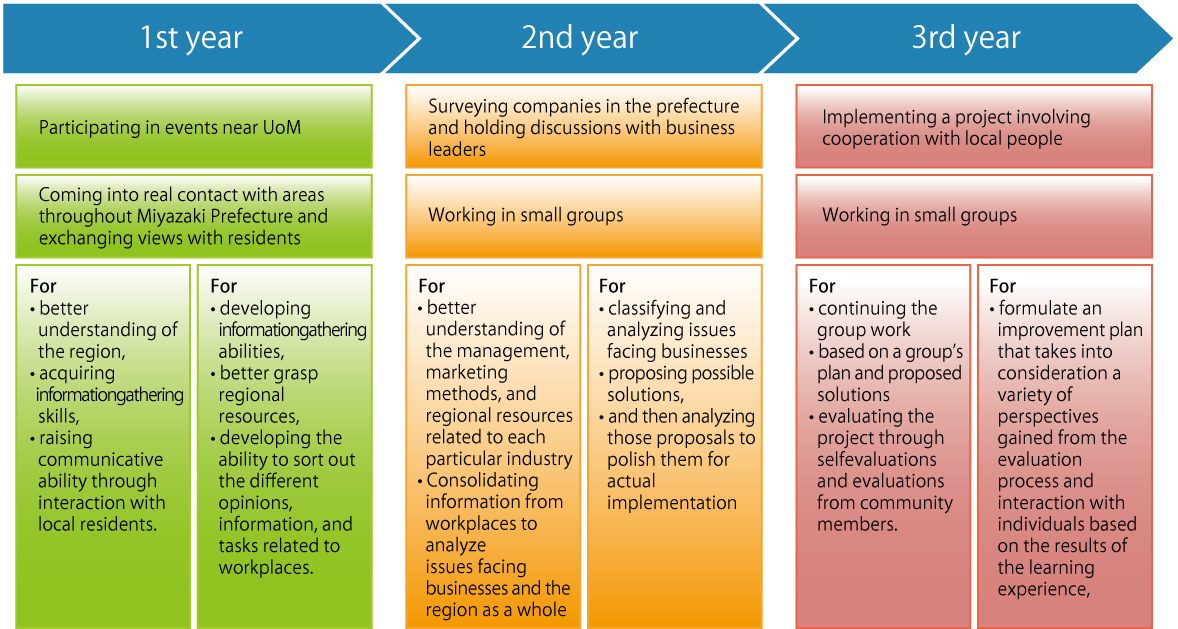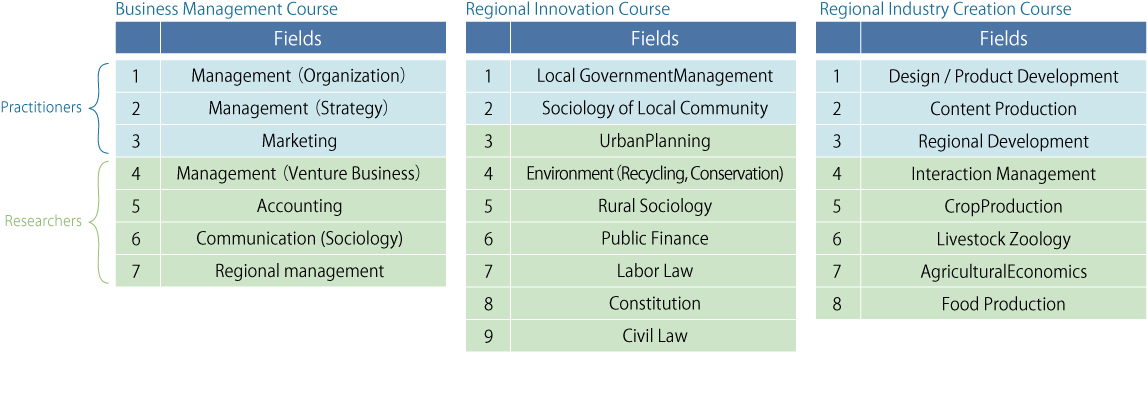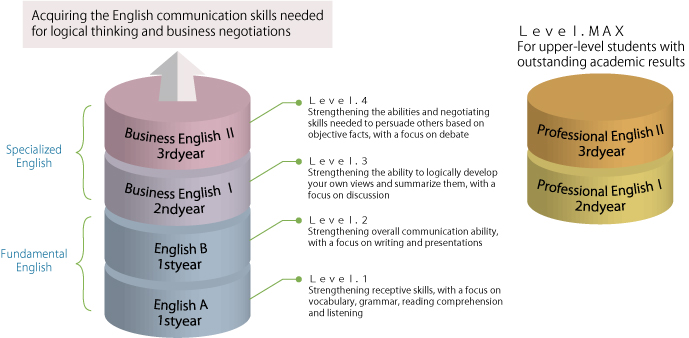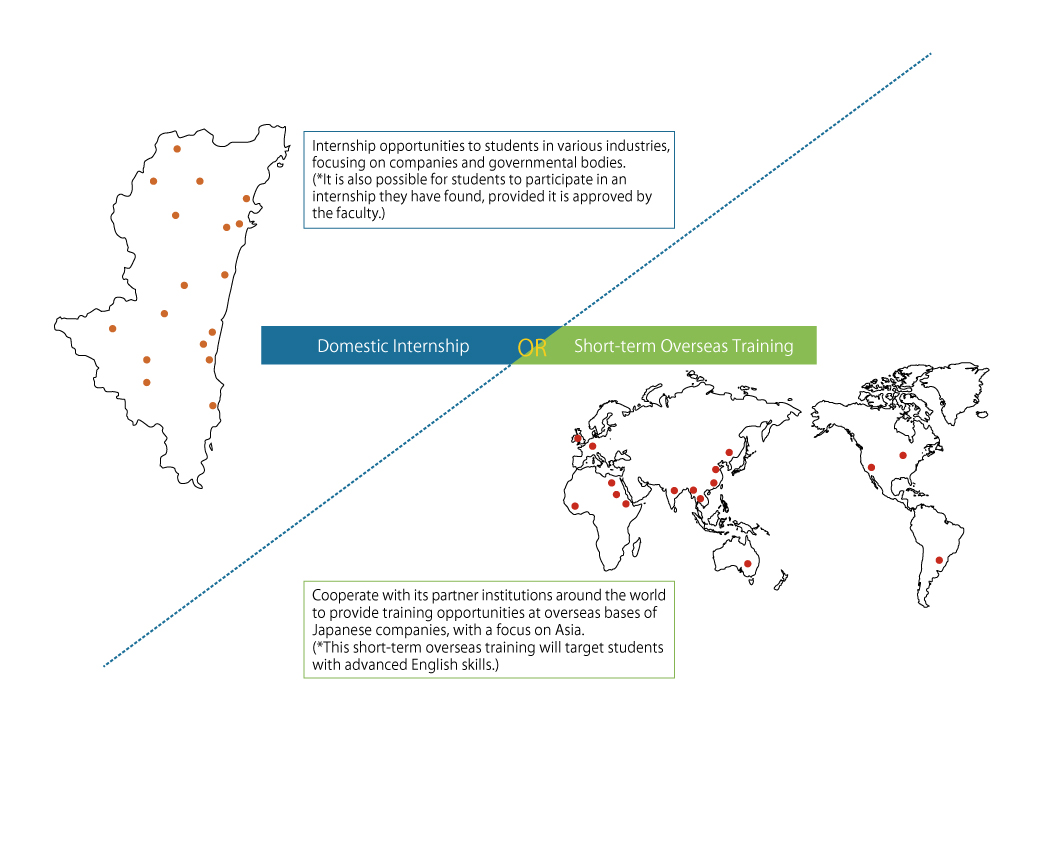University of Miyazaki (UoM) has launched its 5th faculty to cultivate social innovators as future leaders for regions.
In order for students to acquire the ability to understand and utilize local resources and then generate real-world business results, they will be taught skills that include:
✓Planning and implementation capacity
✓Cross-disciplinary knowledge (social sciences, agriculture, engineering)
✓High-level management capacity
✓English communication skills for business negotiations
The Faculty of Regional Innovation, launched in 2016, aims to contribute to sustainable regional development. The new faculty has generated high expectations for its objective of contributing to regional and industrial development on the basis of the natural and social resources as well as the accumulated knowledge and expertise of the University of Miyazaki.
The educational approach of the new faculty emphasizes the need to gain management knowledge and skills. Students learn subjects with a strong emphasis on management, while acquiring basic knowledge in a range of academic disciplines needed to understand local resources and tackle regional problems, such as the social sciences, agriculture, and engineering. On the basis of this approach, the faculty aims to cultivate students to become regional innovators able to comprehensively manage sustainable regional development through addressing socio-economic problems (e.g., population decline and stagnant regional economies) and to create innovative value within the regional industrial and business settings through recognizing and utilizing the available local resources.
Students in the Faculty of Regional Innovation acquire a solid management foundation (management, marketing, accounting, etc.) by completing the subjects Management Core and Management Advanced, in addition to Basic Education. The faculty also offers three courses?Regional Industry Creation, Regional Management and Development, and Business Management?that allows students to gain maximum exposure to their chosen field of specialization. Students can choose one of these courses along with those related to their given career objective. In addition, students engage with real-world practitioners through hands-on learning opportunities, including domestic and international internships at companies or local governments and ongoing fieldwork conducted in communities and within organizations.
In order to develop students' capacity to communicate logically and negotiate successfully in English, the faculty's curriculum includes Professional English.
3 courses in line with industries and local characteristics of Miyazaki
Students select one of three courses (Regional Industry Creation, Regional Development, or Business Management),depending on their career places, and also take specialized audjects to enahance the expertise of specifie fields.
The Faculty of Regional Innovation recognizes the various issues that our local communities are facing and strives to contribute to the revitalization of local industries and regional development. Our curriculum is designed to provide students with a wide range of fundamental knowledge in the social sciences, humanities, agriculture, and engineering, as well as business management. Based on a keen awareness of the importance of practical applications of what students learn, our curriculum includes collaboration with the local governments, industries, and members of the community as a means of cultivating human resources capable of planning and putting into practice the local development initiatives. During the second semester of their second year, students choose one of the three available courses on how to become an immediate asset to the local community. Listed below is the human-resource vision of each course.
 Fostering an understanding of the value of regional resources(agiculture,nature,energy,culture,etc.)and to foster the human resources needed to create and create new businesses and valus through the utilization of those resources,including the promotion of retall business and the planning and launching of new products.
Fostering an understanding of the value of regional resources(agiculture,nature,energy,culture,etc.)and to foster the human resources needed to create and create new businesses and valus through the utilization of those resources,including the promotion of retall business and the planning and launching of new products.
Potential career path
Food-industry corporstion,"sixth industry" business,agricultural organization,trading company (related to food products), distribution industry (department store,supermarket etc.), travel industry, tourism business,etc.
Innovative leaders who . . .
 Fostening human rescources capable of resolving issues fagion(e.g. falling populations in mountainous communities and declining urban centers)and engaging in overall management related to creating a sustainsble reglon by addressing the economic functions of communities around the perfecture as well as social and economic functions.
Fostening human rescources capable of resolving issues fagion(e.g. falling populations in mountainous communities and declining urban centers)and engaging in overall management related to creating a sustainsble reglon by addressing the economic functions of communities around the perfecture as well as social and economic functions.
Potential career path
Government (national, prefectural, or municipal), transportation industry,
city planning consultant,NPO(related to city planning),entrepreneur, etc.
Innovative leaders who . . .
 Cultivating business leaders that have an overall view of industrial and economic structure in japan and overseas and are capable of investigating and analyzing socio-economic conditions in the region .with an eye to future trends and building points of linkage between domestic and overseas markets markets, encouraging entrepreneurship,supporting new businesses, and developing the regional economy,thereby generating new value and innovation and contributing to the regional industries.
Cultivating business leaders that have an overall view of industrial and economic structure in japan and overseas and are capable of investigating and analyzing socio-economic conditions in the region .with an eye to future trends and building points of linkage between domestic and overseas markets markets, encouraging entrepreneurship,supporting new businesses, and developing the regional economy,thereby generating new value and innovation and contributing to the regional industries.
Potential career path
Entrepreneur(management consulting,etc.),local corporation,manufacturing firm.financial institution, integrated trading company,ICU firm,etc.
Innovative leaders who . . .
Step-by-step progression of management courses

Students incrementally acquire knowledge in their first year to prepare for the Management Core and Management Advanoedclasses, with the aim of becoming leaders equipped with total management skills.
> Learn by doing / Practical training
Visit fields, companies, local governments and many other real situations, and learn by working together with real business and development people in the real world.
> Multi-Disciplinary learning
Professors and lecturers from various fields and backgrounds: from business, working at governments and various academic fields (social science, agriculture, livestock, law, engineering, etc.)
> Professional English
Students are required to take intensive English classes, especially focusing on "Professional English"
> Internship (domestic and international)
Students are required to experience internship during 2nd or 3rd year in the program for one month in Japanese or foreign companies / organization.

Over the three years of their study, students will engage in in learning-by-doing activities aimed at addressing regional problems in a variety of fields, and these activities will be organically linked to course content in a step-by-step manner so that students acquire the skills in information gathering, analysis, planning, implementation, and management that will make them immediate assets in their professional life. Our aim is to foster "total management leaders." The learning-by-doing activities include not only areas in Miyazaki City near the university (Kibana, Kiyotake, Aoshima), but also remote mountain communities and urban districts, as well as production sites for primary, secondary, and tertiary industries. All students in the faculty will participate in this practical training and after grasping the situations in various areas and the particular issues at hand, students will spend their final year and a half in learning more about management, apart from their classes, and use that knowledge as the basis for devising concrete plans to solve regional issues and actually implementing measures in their training areas together with the local people.


UoM will draw on its track record to date to offer students multedisciplinary core courses (in agriculture and engineering) that are geared to revitalizing and innovating Miyazaki prefecture.
Taking courses that span different fields serves as the basis for cultivating the multifaceted viewpoint and experience needed to engage in substantial management.
Each subject is taught by a range of instructors, including professors from the social and natural sciences as well as researchers and professionals with real-world business experiences, so that students can acquire knowledge from a multidisciplinary perspective, in addition, each course is led by multiple instructors from a variety of fields who provide guidance to students engage through group works and hands-on activities.
The 24 professors belonging to the new faculty teach specialzed and practical classes in accordance with their particular Advanced courses, The faculty members include 8 professors with a business background who will be able to offer students practical education that includes hands on business experience and an understanding of the social situation.Along with the full-time teaching staff, plans call for the new faculty to team up with professors from other faculties at UoM.

Business English to build logical thinking and negotiation skills

Students take Fundamental English classes in their 1st year that serve as the basis for the business English they learn in the 2nd and 3rd year,with the aim being to acquire the communication skills needed for developing logical arguments and negotiations.
Students with upper-level English skills and outstanding academic results can take Professional English I & II to further enhance their English ability.
Using extended holidays to boost individual skills
Students can boost their practical skills in their second or third year by taking an extended holiday to participate in a domestic internship or short-team overseas training program.The internships aim to give students the experience of working at an actual company so they can better understand the sort of skills that are in demand and acquire practical skills based on their own initiative.The overseas training, which aims for students to gain a global perspective, involves the cooperation with one of UoM partner institutions in Asia,with students under going training at either a Japanese corporation with overseas bases, a government agency, or other organization.
